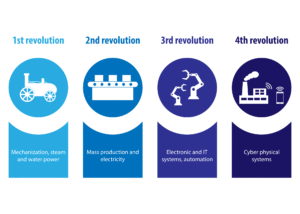Process industry, automation solutions and Industry 4.0 – absolutely new technical terms for me as an industry newcomer. Having worked for a consumer goods and pharmaceutical manufacturer for years, I am used to physical products. Creams, body lotions, mouthwashes, and painkillers are my profession. So my first question was: What do we actually produce at Yokogawa? What are our top products? No matter who I have asked this question so far, my counterpart wrinkles his forehead and thinks about how to explain the field of activity to me, a person without a technical background, as simple and practice-oriented as possible.
I see switch boxes, computers, devices for measuring gas and temperatures. In addition, there are 30,000 abbreviations such as TDLS and DTSX.
To be honest, it is not that simple. But somewhere I have to start to get an overview. In this context, it is advantageous to deal with the term “Industry 4.0”.
Let’s go!
What is Industry 4.0?
Are you ready for Industry 4.0? If you google “Industry 4.0”, it becomes clear that a lot of people are not aware of the meaning and definition of the term.
What is actually this fourth industrial revolution?
The Industry 4.0 platform defines Industry 4.0 as “the intelligent networking of machines and processes in the industry with the aid of information and communication technology”.
The areas of application are manifold. Here are some examples:
- Different manufacturers, digital communication, common end product: Digital networking of different companies involved in the production of a common product. Production steps can be better coordinated and machines can be used in a more targeted way.
- Production in modules: In the future, production lines will be modular. The advantages are obvious: New products can be realized faster and more economically. This means that an individual product can also be produced in small quantities at affordable prices, such as individually designed cups. The factory of the future is changeable and adapts to the customer’s requirements.
- Customer-oriented products: The customer is the focus of product development. The “Voice of Consumer” is more important than ever. Already today, customers can assemble and individualize products according to their wishes, such as individualized shoes or cars. The new devices with SMART technologies measure customers’ usage behavior and are used by manufacturers to respond even better to customer needs.
- Logistics 4.0: Smart networking optimizes the flow of goods. Machines automatically indicate when the material is running out and needs to be replenished.
- Data analysis: By means of data analysis, data from the production process and the current status of the product are compared with each other. This holds an enormous potential: New business models and services can be offered.
- Circular product cycle: The complete life cycle of a product is documented with data support. Even the design and selection of the materials used can determine the extent to which the product can be reused or recycled.
[ot-video][/ot-video]
But what does industry 4.0 actually mean for the process industry? I will discuss this in the second part of the series on Industry 4.0. Stay tuned!





